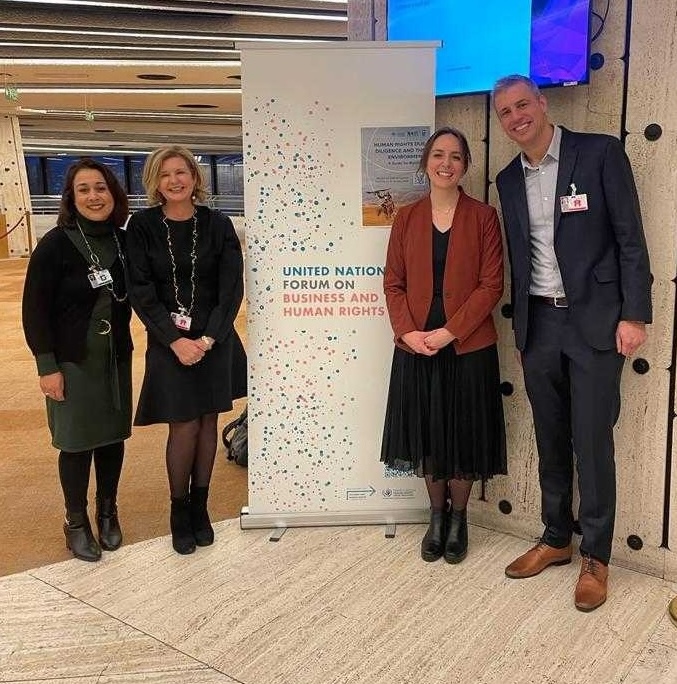12th UN Forum on Business and Human Rights – Day Three Recap
December 6, 2023
Blogs
By Claire Kaula
The final day of the 12th UN Forum on Business and Human Rights ended by reflecting on the decades of positive movement in the field and invigorated participants to continue furthering human rights in business. Vice-chairperson Robert McCorquodale noted that only 30 years ago people still argued over whether companies should respect human rights. Now, many years later, there is little debate on this subject and the 12th Forum held fruitful discussions on how to implement the UN Guiding Principles through diverse perspectives.
The panels at the 12th UN Forum focused on areas that are developing, themes that require special attention, and issues everyone in the field is grappling with. The panels were particularly relevant to companies building up their human rights strategies and industries new to incorporating human rights. For example, a few panels from the last day discussed the continued progress on workers’ remedies, the required intersectional approach to gender, and inclusion of the finance industry. Read the summaries of the panels and what companies should consider implementing below.
Panel: Worker-driven Remedy in Global Supply Chains: A Practical Perspective
Moderator: Olga Martin-Ortega (Professor of International Law at the School of Law, University of Greenwich)
Speakers: Pauline Göthberg (National coordinator, Swedish Regions), Ruwan Subasinghe (Legal Director, The International Transport Workers’ Federation (ITF)), Gopinath K Parakuni (Director Strategy, Cividep India), Irene Aycinena Abascal (Sustainability Assurance Manager, Grupo HAME), Joseph Paul Maliamauv (Labour & Migrant Rights Advocate, Tenaganita), and Björn Claeson (Director, Electronics Watch)
Workers are core to the global supply chain yet still regularly do not have access to effective remedy. The panellists made it clear that a key reason for this is a lack of meaningful worker engagement. The solution is that remedies and remediation processes need to be worker–driven. Meaningful engagement is critical when determining the most appropriate remedy because remedies come in many different forms, like compensation or reinstatement of employment. Panellists emphasized the essential role of unions in educating workers on their rights, assisting with access to remedy mechanisms, as well as helping address the inherent power imbalance between workers and companies.
Key Takeaways for Companies:
- Consult with workers meaningfully to develop and ensure they have access to effective remedy mechanisms.
- Consider providing training materials to workers in the supply chain on their rights and the availability of mechanisms to access remedy
- Ensure there is meaningful engagement where the company and worker collaboratively agree on the remedy.
Panel: Gender-Responsive Human Rights Due Diligence: From Inclusion to Effective Protection
Moderator: Fernanda Hopenhaym (Member, UN Working Group on Business and Human Rights)
Speakers: Clare Iery (Chief Human Rights Counsel, The Procter & Gamble Company), Mariana Laura Grosso (Coordinadora del Programa Empresas y DDHH, Defensoría del Pueblo de la Nación Argentina), Namit Agarwal (Social Transformation Lead, World Benchmarking Alliance), and Mmapaseka Steve Letsike (Access Chapter 2)
While there is a gender panel every year at the Forum, it has moved from focusing on women to the full spectrum of gender. The moderator discussed that responding to gender issues is complex for companies because of gender norms, cultural biases, and power dynamics. The panelists shared that companies need to take an intersectional gender approach to their human rights due diligence process. But as Namit Agarwal from the World Benchmarking Alliance highlighted, companies still have a lot of work to do. Out of 1000 companies, the gender benchmark score is only 17 percent. Companies can improve by having a gender equity commitment, allocating resources to improve gender equity, and implementing trainings on this topic. The comments and questions from participants further highlighted the importance to focus on intersectionality by bringing up that the intersectionality between gender and disability, as well as between gender and being indigenous, were missing from the session.
Key Takeaways for Companies:
- Implement a gender equity commitment and ensure resources and trainings are provided to enable the commitments to be met.
- Ensure an intersectional approach is taken when the company is responding to gender issues and conducting due diligence. When doing so make use of the gender guidance for the UNGPs, the UN Standards of Conduct for Business: Tackling Discrimination against Lesbian, Gay, Bi, Trans, & Intersex People, and other resources available at the UN Gender Lens to the UNGPs webpage.
Panel: Investors, ESG and BHR: Open Consultation
Moderator: Robert McCorquodale (Vice-chairperson, UN Working Group on Business and Human Rights)
Speakers: Anita Dorett (Director, Investor Alliance for Human Rights), Kindra Mohr (Manager, Financial Services and Human Rights, BSR), and Manele Mpofu (Legal Officer, Zimbabwe Environmental Law Association)
In preparation to write a report on better aligning Environmental, Social and Governance (ESG) approaches in the financial sector, the Working Group on Business and Human Rights is conducting many consultations with stakeholders to collect perspectives. The financial sector has large positive and negative impacts on human rights as a result of where they choose to invest, or not to invest. The Working Group highlighted that ESG investing has been expanding for the last several decades. The upcoming report will be focusing on the risk of the financial industry to people, instead of focusing on financial materiality.
Some perspectives and considerations shared include:
- There is no single standard definition of ‘ESG’.
- Struggles remain with quantifying methods of social outcomes used for ESG investing.
- There is a lack of focus on the ESG risk throughout the value chain, instead focus is on companies’ own operations.
- It is important for companies to be transparent on their human rights risks and strategies for investors.
Be on the lookout for the Human Rights Working Group’s report in June 2024 when they present it to the UN Human Rights Council.
For more information on how to incorporate human rights into your business strategy contact Article One at hello@articloneadvisors.com. If you are interested in the full recording of the panels, please access them on the UN website here.
